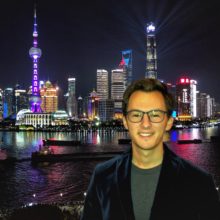By Katherine MacIvor
David Brenman graduated with an MA in Political Science and Collaborative Specialization in Contemporary East and Southeast Asian Studies in November 2018. But before receiving his diploma, he had already relocated to Shanghai in July 2018 to work for a company that provides specialist risk consulting services. In his role, he is involved in a wide variety of investigative cases, handling research, editing, and project management, among other responsibilities. “It’s a great position to learn the nuts and bolts of how commerce operates in China.”
David credits his Master’s program for preparing him for the job. “Through my participation in the program I was exposed to scholarship on topical issues in the region, which complemented my course of study in my home department [Political Science] nicely. The research I did on China as a part of the program proved to be especially useful. Since arriving [in Shanghai], I’ve found that much of what I learned in the program is useful to better contextualize and understand current dynamics in China.”
David wrote his major research paper on the nature of transparency in China, considering transparency as a component of governance and a source of political legitimacy at the state’s disposal. He looked into historical precedents for political transparency and accountability in China and offered an evaluation of the effectiveness and limitations of contemporary Chinese open government regulations.
Language study and experience abroad have also played key roles in David’s journey. He began learning Mandarin in high school and continued during his Bachelor’s degree, including a year-long exchange program at Fudan University in Shanghai. He then spent six months in Beijing, working as an intern in the political section at the Canadian Embassy. “At work, I have certainly benefitted from having a facility with Mandarin and use it to converse with most of my colleagues. I enjoy working in an environment where almost everyone can comprehend both Mandarin and English, and find that using the language in the course of my daily life in Shanghai is extremely rewarding.”
What’s David’s advice for prospective and current students? “I would highly recommend prospective U of T graduate students interested in the region to apply to the program, and encourage current program participants to consider working or studying in East or Southeast Asia as a next step.” Students in the Collaborative Specialization in Contemporary East and Southeast Asian Studies can apply for funding such as the Dr. David Chu Scholarships in Asia-Pacific Studies to help cover the costs of travel to Asia for research purposes.
